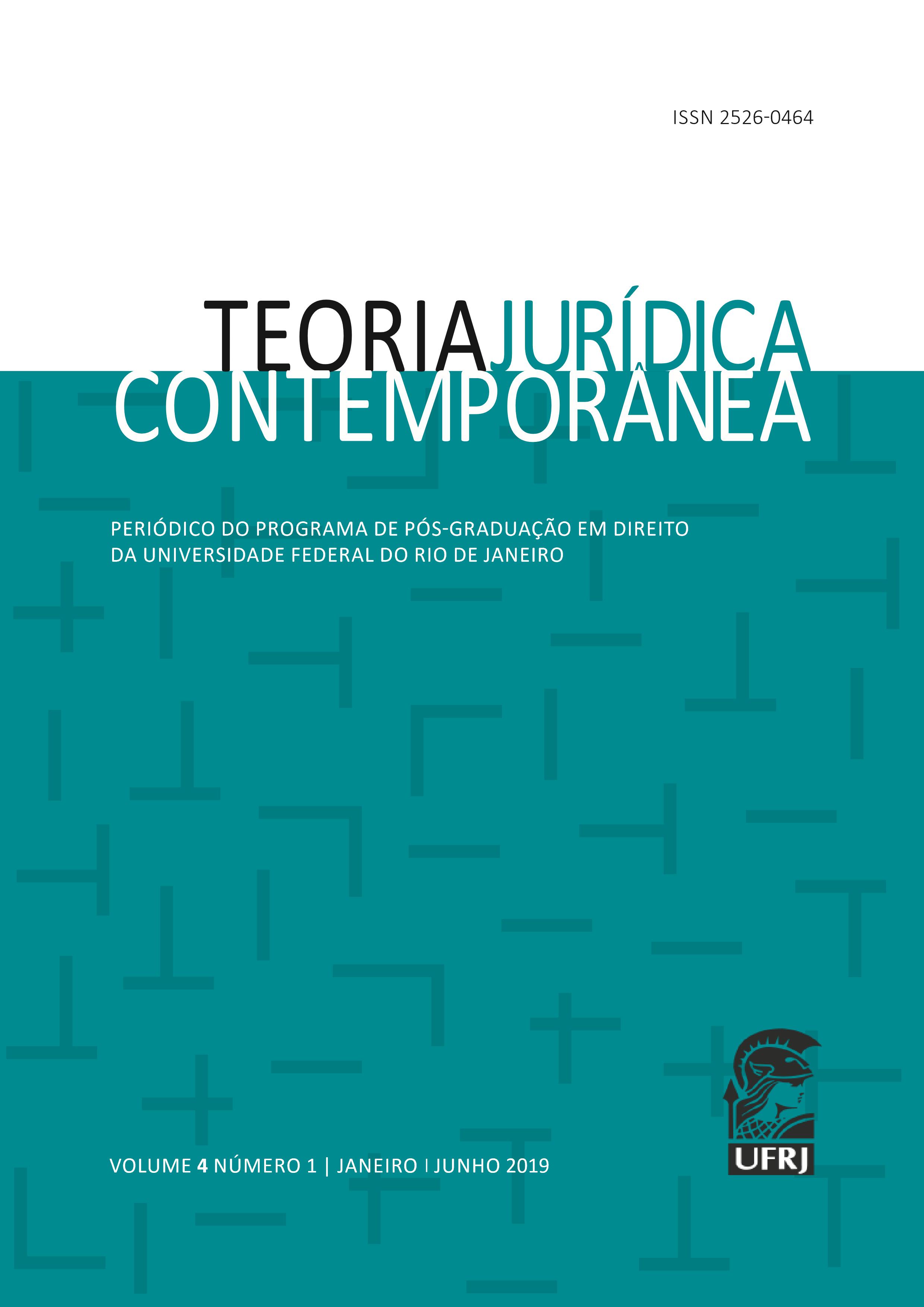O Direito do Trabalho (des)conectado nas plataformas digitais
DOI:
https://doi.org/10.21875/tjc.v4i1.24367Keywords:
Economia digital, Economia de compartilhamento, Plataformas digitais, Uberização, Subordinação Jurídica, Precarização do trabalho, Digital economy, Sharing economy, Electronic work platforms, Uberization, Legal subordination, Precariousness of workAbstract
RESUMO:
Este artigo trata dos impactos das plataformas digitais no Direito do Trabalho, tomando como exemplo sintomático o padrão da plataforma Uber. Inicia discutindo o cenário da economia digital e suas transformações nos modos de organizar a atividade empresarial, caracterizando a disrupção destas tecnologias e examinando criticamente se tais inovações situam-se realmente no discurso de economia do compartilhamento. Adiante, aborda as condições fáticas das plataformas de trabalho, questionando a dimensão formal-jurídica de liberdade e a condição econômica de hipossuficiência. Examina o caso da Uber como paradigma do modelo de organização empresarial desta economia digital e a situação dos seus motoristas tidos como parceiros para, ao final, pontuar algumas conclusões a cerca da necessidade do Direito Trabalho estar conectado com essas novas relações sociais
ABSTRACT:
This article deals with the impact of digital platforms in Labor Law, taking as a symptomatic example the standards of the Uber platform. It begins by discussing the the digital economy scenario and its transformations in the way business activity organize itself, characterizing the disruption of these technologies and critically examining whether such innovations are really part of the sharing economy speech. Hereinafter, it addresses the factual conditions of work platforms, questioning the formal-legal dimension of freedom and the economic condition of hypo-sufficiency. It examines the case of Uber as a paradigm of a business model organization in the digital economy and the situation of its drivers, taken as partners in order to, in the end of it, point some conclusions about the need of Labor Law to be connected with these new social relationships.
Downloads
References
AMADO, João Leal; SANTOS, Catarina Gomes. A Uber e os seus motoristas: mind the gap! In: CHAVES JÚNIOR, José Eduardo de Resende (Org.). Tecnologias Disruptivas e a Exploração do Trabalho Humano. São Paulo: Ltr, 2017.
CARELLI, Rodrigo de Lacerda. O Caso Uber e o Controle por Programação: de carona para o Século XIX. In: CHAVES JÚNIOR, José Eduardo de Resende (Org.). Tecnologias Disruptivas e a Exploração do Trabalho Humano. São Paulo: Ltr, 2017.
GAUTHIER, Gustavo. Disrupción, economia compartida y derecho. Fundación de Cultura Universitária: Montevideo, 2016.
KALANICK, Travis. Fatos e dados sobre a Uber. Disponível em: https://newsroom.uber.com/brazil/fatos-e-dados-sobre-a-uber. Acesso em 28 jan.2018.
KALIL, Renan Bernardi. Direito Do Trabalho E Economia De Compartilhamento: Apontamentos Iniciais. In: KIRA, Beatriz (Org.). Economias do compartilhamento e o direito. Curitiba: Juruá, 2017.
KRAMER, Josiane Caldas. A Economia Compartilhada e a Uberização Do Trabalho: Utopias do Nosso Tempo? Curitiba, 2017, 129p. Dissertação de Mestrado – Universidade Federal do Paraná. Disponível em: <https://acervodigital.ufpr.br/handle/1884/47786>. Acesso em: 15 dez. 2018, 13:00:00.
LEHDONVIRTA, Vili. The online gig economy grew 26% over the post year, Disponível em: <https://ilabour.oii.ox.ac.uk/the-online-gig-economy-grew-26-over-the-past-year>. Acesso em: 26 de janeiro de 2019, 09:10:00.
SARMENTO, Daniel. Ordem Constitucional Econômica, Liberdade e Transporte Individual de Passageiros: o “caso Uber”. Rio de Janeiro, [s.n], 10 jul. 2015. Disponível em: <http://s.conjur.com. br/dl/paracer-legalidade-uber.pdf>. Acesso em: 02 jan. 2019, 10:30:00.
SCHOLZ, Trebor. Cooperativismo de plataforma: Os Perigos da Uberização. O Bem Comum Como Alternativa à Precarização do Trabalho e da vida. Tradução: Rafael A. F. Zanatta. São Paulo: Elefante, 2017.
SLEE, Tom. Uberização: A Nova Onda do Trabalho Precarizado. Tradução: João Peres. São Paulo: Elefante, 2017.
SMITH, Rebecca.; LEBERSTEIN, Sarah. Rights on demand: Ensuring workplace standards and worker security in the on-demand economy (New Yorl, National Employment Law Project). Disponível em: <https://nelp.org/wp-content/uploads/Rights-On-Demand-Report.pdf>. Acesso em: 26 de janeiro de 2019, 14:20:00.
SUNDARARAJAN, Arun. The sharing economy: Then end of employment and the rise of crowd-based capitalism. Cambridge: The MIT Press, 2016.
REIS, Daniela Muradas; CORASSA, Eugênio Delmaestro. Aplicativos de Transporte e Plataforma de Controle: o mito da tecnologia disruptiva do emprego e a subordinação por algoritmos. In: CHAVES JÚNIOR, José Eduardo de Resende (Org.). Tecnologias Disruptivas e a Exploração do Trabalho Humano. São Paulo: Ltr, 2017.
TEODORO, Maria Cecília Máximo; DA SILVA, Thais Claudia D'Afonseca; ANTONIETA, Maria. Disrupção, economia compartilhada e o fenômeno Uber. In: Revista da Faculdade Mineira de Direito, Belo Horizonte, v. 20, n. 39, p. 1-30, abr. 2017. Disponível em: <http://periodicos.pucminas.br/index.php/Direito/article/view/14661/0>. Acesso em: 07 fev. 2019, 20:00:00.
VASCONCELLOS, Antônio Gomes de; VALENTINI, Rômulo Soares. Tecnologia da Informação e seus Impactos nas Relações Capital-Trabalho. In: CHAVES JÚNIOR, José Eduardo de Resende (Org.). Tecnologias Disruptivas e a Exploração do Trabalho Humano. São Paulo: Ltr, 2017.
Downloads
Published
Issue
Section
License
The authors who publish in this journal agree with the following terms:
1. The authors maintain the copyright and grant the journal the right of first publication, with the work simultaneously licensed under the Creative Commons Attribution License that allows the sharing of the work with recognition of authorship and initial publication in this journal.
2. Authors are allowed to assume additional contracts separately, for non-exclusive distribution of the version of the work published in this journal (e.g., publishing in an institutional repository or as a book chapter), with acknowledgment of authorship and initial publication in this journal.
3. Authors are allowed and encouraged to publish and distribute their work online (e.g., in institutional repositories or as a personal page) at any point before or during the editorial process, as this may generate productive changes, as well as increase the impact and citation of the published work (See The Effect of Open Access).

This work is licensed under a Creative Commons Attribution-ShareAlike 3.0 Brazil License.

